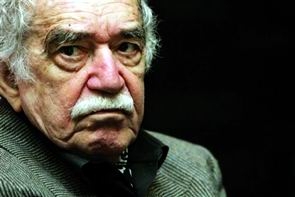(单词翻译:单击)
名著阅读
Tired of preaching in the open, Father Nicanor decided to undertake the building of a church, the largest in the world, with life-size saints and stained-glass windows on the sides, so that people would come from Rome to honor God in the center of impiety. He went everywhere begging alms with a copper dish. They gave him a large amount, but he wanted more, because the church had to have a bell that would raise the drowned up to the surface of the water. He pleaded so much that he lost his voice. His bones began to fill with sounds. One Saturday, not even having collected the price of the doors, he fell into a desperate confusion. He improvised an altar in the square and on Sunday he went through the town with a small bell, as in the days of insomnia, calling people to an openair mass. Many went out of curiosity. Others from nostalgia. Others so that God would not take the disdain for His intermediary as a personal insult. So that at eight in the morning half the town was in the square, where Father Nicanor chanted the gospels in a voice that had been lacerated by his pleading. At the end, when the congregation began to break up, he raised his arms signaling for attention.
"Just a moment," he said. "Now we shall witness an undeniable proof of the infinite power of God."
The boy who had helped him with the mass brought him a cup of thick and steaming chocolate, which he drank without pausing to breathe. Then he wiped his lips with a handkerchief that he drew from his sleeve, extended his arms, and closed his eyes. Thereupon Father Nicanor rose six inches above the level of the ground. It was a convincing measure. He went among the houses for several days repeating the demonstration of levitation by means of chocolate while the acolyte collected so much money in a bag that in less than a month he began the construction of the church. No one doubted the divine origin of the demonstration except José Arcadio Buendía, who without changing expression watched the troop of people who gathered around the chestnut tree one morning to witness the revelation once more. He merely stretched on his stool a little and shrugged his shoulders when Father Nicanor began to rise up from the ground along with the chair he was sitting on.
"Hoc est simplicissimus," José Arcadio Buendía said. "Homo iste statum quartum materiae invenit."
Father Nicanor raised his hands and the four legs of the chair all landed on the ground at the same time. "Nego," he said. "Factum hoc existentiam Dei probat sine dubio."
Thus it was discovered that José Arcadio Buendía's devilish jargon was Latin. Father Nicanor took advantage of the circumstance of his being the only person who had been able to communicate with him to try to inject the faith into his twisted mind. Every afternoon he would sit by the chestnut tree preaching in Latin, but José Arcadio Buendía insisted on rejecting rhetorical tricks and the transmutation of chocolate, and he demanded the daguerreotype of God as the only proof. Father Nicanor then brought him medals and pictures and even a reproduction of the Veronica, but José Arcadio Buendía rejected them as artistic objects without any scientific basis. He was so stubborn that Father Nicanor gave up his attempts at evangelization and continued visiting him out of humanitarian feelings. But then it was José Arcadio Buendía who took the lead and tried to break down the priest's faith with rationalist tricks. On a certain occasion when Father Nicanor brought a checker set to the chestnut tree and invitedhim to a game, José Arcadio Buendía would not accept, because according to him he could never understand the sense of a contest in which the two adversaries have agreed upon the rules. Father Nicanor, who had never seen checkers played that way, could not play it again. Ever more startled at José Arcadio Buendía's lucidity, he asked him how it was possible that they had him tied to a tree.
"Hoc est simplicissimus," he replied. "Because I'm Crazy."
From then on, concerned about his own faith, the priest did not come back to visit him and dedicated himself to hurrying along the building of the church. Rebeca felt her hopes being reborn. Her future was predicated on the completion of the work, for one Sunday when Father Nicanor was lunching at the house and the whole family sitting at the table spoke of the solemnity and splendor that religious ceremonies would acquire when the church was built, Amaranta said: "The luckiest one will be Rebeca." And since Rebeca did not understand what she meant, she explained it to her with an innocent smile:
"You're going to be the one who will inaugurate the church with your wedding."
Rebeca tried to forestall any comments. The way the construction was going the church would not be built before another ten years.
尼康诺神父讨厌在旷地上继续布道,决定竭尽全力建筑一座世界上最大的教堂,有圣徒的等身雕像和彩绘玻璃窗,以便罗马来的人也能在无神论者的中心地区向上帝祈祷。他拿着一个铜盘,四处募捐。人行慷慨布施,可是未能满足他的要求,因为教堂要有一个大钟,此种钟声能使淹死的人浮到水面。他向大家苦苦哀求,甚至嗓子都哑了,疲乏得骨头都酸痛了。一个星期六,他估量捐款甚至不够做教堂的门,就陷入了绝望状态。星期天,他在市镇广场上搭了个圣坛,象失眠症流行时那样,拿着一个小铃铛,跑遍了所有的街道,招呼人们去参加旷地弥撒。许多人是出于好奇而来的,另一些人是由于无事可干,还有一些人唯恐上帝把他们藐视神父看做是冒犯他自己。就这样,早上八点钟,全镇一半的人都聚在广场上,尼康诺神父朗诵了福音书,声嘶力竭地恳求大家捐助。弥撒结束时,在场的人己经开始四散,他就举起手来要大家注意。
“等一下,”他说。“你们马上可以得到上帝威力无穷的确凿证明。”
协助尼康诺神父做弥撒的一个孩子,端来一杯浓稠、冒气的巧克力茶。神父一下子就把整杯饮料喝光了。然后,他从长袍袖子里掏出一块手帕,擦干了嘴唇,往前伸出双手,闭上了眼睛。接着,尼康诺神父就在地上升高了六英寸。证据是十分令人信服的。在几天中,神父都在镇上来来去去,利用热腾腾的巧克力茶一再重复升空的把戏,小帮手把那么多的钱收到袋子里,不过一个月工夫,教堂的建筑就已动工了。谁都不怀疑尼康诺神父表演的奇迹是上帝在发挥威力。只有霍·阿·布恩蒂亚不以为然。有一天早上,一群人聚在离栗树不远的地方,参观另一次升空表演,他一个人仍然完全无动于衷,看见尼康诺神父连同坐椅一起升到地面上头以后,他只在自己的凳子上微微挺直身子,耸了耸肩。
“Hoc est simplicissimum(注:拉丁语——这很简单。这个人发现了物质的第四种状态。”)霍·阿·布恩蒂亚说。“Homoistestatum guartum mate- riaeinvenit. ”
尼康诺神父一举手,椅子的四条小腿同时着地。
“Nego,”神父反驳说。“Factum hoc existenltiam DeiProbat Sine dubio.”(注:拉丁语——我否认。这个事实无可辩驳地证明上帝的存在。)大家这才知道,霍·阿·布恩蒂亚的鬼活其实是拉丁语。尼康诺神父终于发现了一个能够跟他交谈的人,决定利用这种幸运的情况,向这个精神病人灌输宗教信仰。每天下午他都坐在栗树旁边,用拉丁语传道,可是霍·阿·布恩蒂亚拒不接受他的花言巧语,也不相信他的升空表演,只要求拿上帝的照片当作无可辩驳的唯一证明。于是,尼康诺神父给他拿来了一些圣像和版画,甚至一块印有耶稣像的手帕,然而霍·阿·布恩蒂亚加以拒绝,认为它们都是没有任何科学根据的手工艺品。他是那么顽固,尼康诺神父也就放弃了向他传道的打算,只是出于人道主义感情继续来看望他。这样,霍·阿·布恩蒂亚取得了主动权,试图用理性主义的诡谲道理动摇神父的信仰。有一次,尼康诺神父带来一盒跳棋和棋盘,要霍·阿·布恩蒂亚跟他下棋,霍·阿·布恩蒂亚拒绝了,因为据他解释,敌对双方既然在重要问题上彼此一致,他看不出他们之间的争斗有什么意义。尼康诺神父对于下棋从来没有这种观点,但又无法把他说服。他对霍·阿·布恩蒂亚的智慧越来越惊异,就问他怎么会捆在树上。
“Hocest Simplicicissimum,(注:拉丁语:我是疯子)他回答,”因为我是个疯子。“
这次谈话之后,神父担心自己的信仰遭到动摇,就不再来看望他了,全神贯注在教堂的建筑上。雷贝卡感到自己又有了希望。她的未来是跟教堂的竣工有关系的,因为有一个星期天,尼康诺神父在她们家中吃午饭的时候,曾在全家的人面前说,教堂建成以后,就能隆重而堂皇地举行宗教仪式了。“最幸运的是雷贝卡,” 阿玛兰塔说。因为雷贝卡不明白她的意思,她就天真地微笑着说:
“因为你可以拿自己的婚礼为教堂揭幕啦。”
雷贝卡试图阻止这样的议论。她认为建筑进度很慢,教堂最快十年才能竣工。
背景阅读

作者简介:
加西亚·马尔克斯(1927一)哥伦比亚作家,记者。生于马格达莱纳省阿拉卡塔卡镇。父亲是个电报报务员兼顺势疗法医生。他自小在外祖父家中长大。外祖父当过上校军官,性格善良、倔强,思想比较激进;外祖母博古通今,善讲神话传说及鬼怪故事,这对作家日后的文学创作有着重要的影响。
加西亚·马尔克斯作品的主要特色是幻想与现实的巧妙结合,以此来反映社会现实生活,审视人生和世界。重要作品有长篇小说《百年孤独》(1967)《家长的没落》(1975)、《霍乱时期的爱情》(1985)等。
本书简介:
《百年孤独》内容复杂,人物众多,情节离奇,手法新颖。马尔克斯在书中溶汇了南美洲特有的五彩缤纷的文化。他通过描写小镇马孔多的产生、兴盛到衰落、消亡,表现了拉丁美洲令人惊异的疯狂历史。小说以“汇集了不可思议的奇迹和最纯粹的现实生活”荣获1982年诺贝尔文学奖。
创作历程:
从1830年至十九世纪末的70年间,哥伦比亚爆发过几十次内战,使数十万人丧生。本书以很大的篇幅描述了这方面的史实,并且通过书中主人公带有传奇色彩的生涯集中表现出来。政客们的虚伪,统治者们的残忍,民众的盲从和愚昧等等都写得淋漓尽致。作家以生动的笔触,刻画了性格鲜明的众多人物,描绘了这个家族的孤独精神。在这个家族中,夫妻之间、父子之间、母女之间、兄弟姐妹之间,没有感情沟通,缺乏信任和了解。尽管很多人为打破孤独进行过种种艰苦的探索,但由于无法找到一种有效的办法把分散的力量统一起来,最后均以失败告终。这种孤独不仅弥漫在布恩迪亚家族和马孔多镇,而且渗入了狭隘思想,成为阻碍民族向上、国家进步的一大包袱。
作家写出这一点,是希望拉丁美洲民众团结起来,共同努力摆脱孤独。所以,《百年孤独》中浸淫着的孤独感,其主要内涵应该是对整个苦难的拉丁美洲被排斥现代文明世界的进程之外的愤懑[mèn]和抗议,是作家在对拉丁美洲近百年的历史、以及这块大陆上人民独特的生命力、生存状态、想象力进行独特的研究之后形成的倔强的自信。这个古老的家族也曾经在新文明的冲击下,努力的走出去寻找新的世界,尽管有过畏惧和退缩,可是他们还是抛弃了传统的外衣,希望溶入这个世界。可是外来文明以一种侵略的态度来吞噬这个家族,于是他们就在这样一个开放的文明世界中持续着“百年孤独”。作者表达着一种精神状态的孤独来批判外来者对拉美大陆的一种精神层面的侵略,以及西方文明对拉美的歧视与排斥。“羊皮纸手稿所记载的一切将永远不会重现,遭受百年孤独的家族,注定不会在大地上第二次出现了。” 作者用一个毁灭的结尾来表达了自己深深的愤懑。


